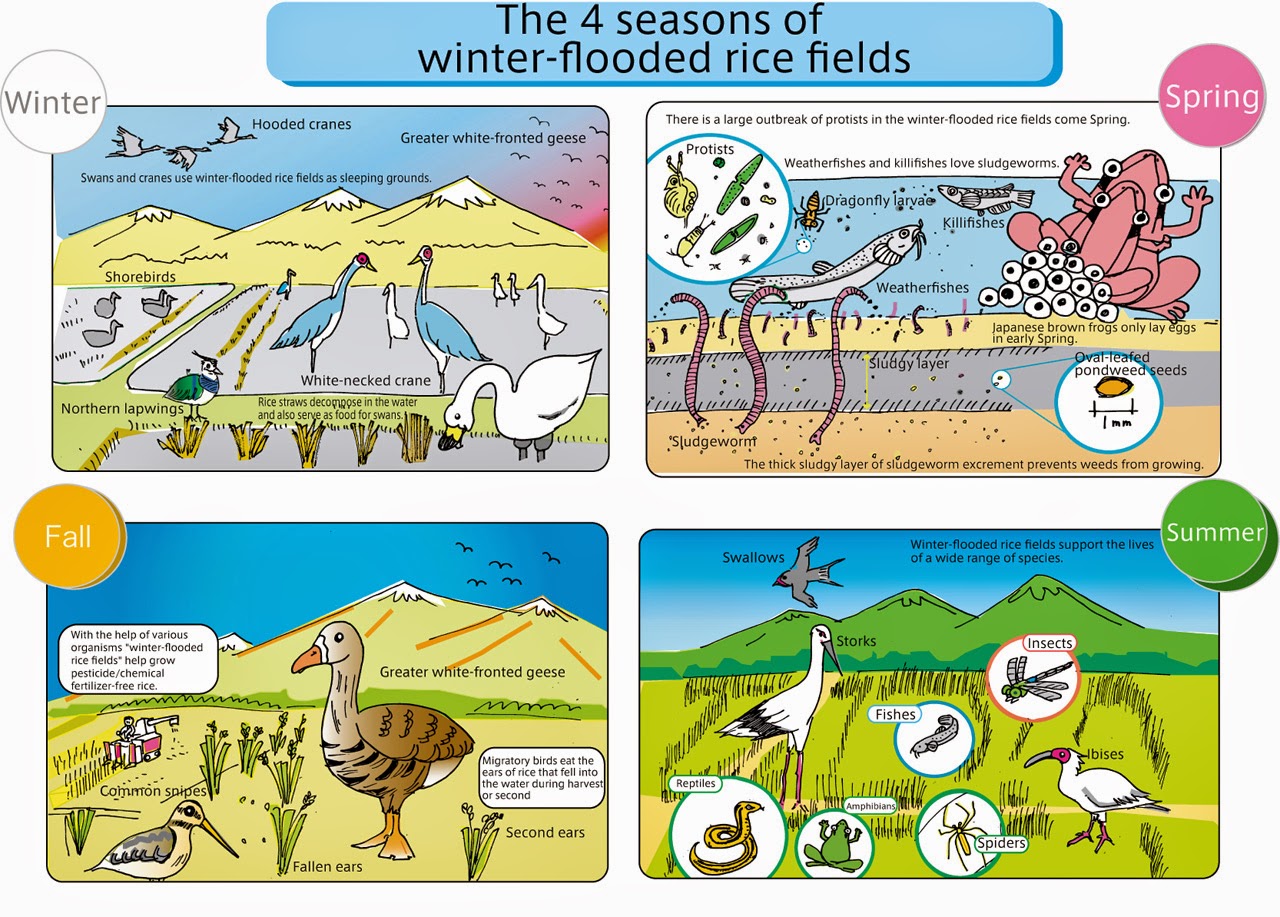In this installment, we will look at the ecosystems that naturally develop in rice fields that do not use chemicals. We will see what makes their home in rice fields and what benefits or harm they might bring with them. We will also see how the use of chemical pesticides actually invites disaster, rather than helps prevents it.
In the absence of pesticides, the water, soil, and rice crops themselves provide a welcoming home for a large number of insects, birds, amphibians, reptiles, and fish.
While it may seem counterinitiative at first, allowing insects of all kinds to move into your rice field is actually the best strategy to use in controlling unwanted pests. This is because while yes, pests will move in, so too will the insects that naturally prey on them. While you'll never get rid of these pests entirely (even with spraying), their natural predators will keep them under control.
Conversely, when you spray for insects, you kill everything. The field becomes uninhabitable for everything. When the effects of pesticides eventually wear off, the only insects attracted first to your field will be pests seeking to destroy your crops. They will come in large numbers as soon as they can establish a foothold. Until you spray again, they will do their thing faster than their natural predators can work to keep their numbers in check, at the cost of your field's health.
A healthy ecosystem will include spiders, dragonflies, and other predatory insects that will eat pests like leaf hoppers, beetles, and leaf borers. Predators generally do not establish themselves in large numbers like the insects they prey on, meaning when a farmer sprays, it is difficult for them to quickly reestablish themselves in a given area, and certainly not fast enough to keep pests in check.
A rice field's ecosystem will also include birds and even fish and amphibians who likewise will feed on insects present in any given field. In addition to controlling pests, fish and birds in particular can contribute to the nutrient cycles rice crops depend on. Fish not only contribute to pest control and nutrients available for rice crops, but they provide an alternative food source for farmers.
In many parts of the world where chemicals aren't used, or used at minimal levels, fish are often cultivated alongside rice. Until recently this was a popular practice in Malaysia. Farmers in Thailand may also recall before the advent of widespread chemical use, the presence of fish in their rice fields.
Just like spraying for insects, the use of chemical fertilizers becomes a constant battle to give crops what they need because the fields themselves can no longer produce nutrients through natural biological cycles.
Farmers switching over to organic agriculture may notice fish, amphibians, and insects returning to their fields, bringing with them their many added benefits associated with each. A thriving ecosystem will balance itself over time, improving the soil and controlling pests in the process, eliminating many of the problems associated with spraying and heavy use of chemical fertilizers.
In using chemicals, farmers are engaged in a constant and expensive battle to keep at bay the imbalance they've created. Often, even with chemical use, the backlash when this imbalance tries to correct itself can be costly, more so than neighboring fields using organic techniques. As more farmers in Thailand switch over to organic techniques, the more obvious the consequences of using chemicals will become.
This is not to say technology in and of itself has no place in agriculture. Instead, it is to say that technology can enhance agriculture so long as we use it to work with rather than fight against biology. After all, in many ways, biology is the "first" or "original technology," Engineers and scientists would never attempt to build one machine to work against the efforts of another, thus agricultural technology should likewise work in harmony with, rather than against nature.
Follow ProgressTH.org on Facebook here or on Twitter here.


